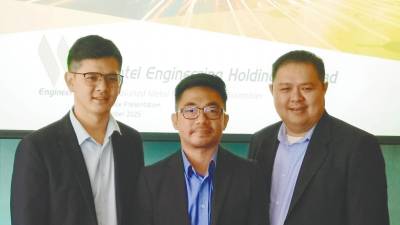KUALA LUMPUR: Metal fabrication firm Wentel Engineering Holdings Bhd is gearing up for a significant leap in production capacity as it readies its new manufacturing facility at Lot 815, near Kempas in Johor.
The plant – with a built-up area of approximately 299,000 square feet – will more than double Wentel’s current footprint, replacing its rented Plant 58 and complementing the existing Plant 11.
“With Lot 815, our manufacturing space will effectively expand two-fold compared to today,” said group CEO Chuah Chong Syn.
“This marks an important milestone in strengthening our foundation for long-term growth.”
Chuah explained that the additional space will translate directly into stronger topline performance.
“We are projecting annual revenue growth of around 20% year-on-year over the next five years as the new plant ramps up,” he said.
Wentel expects the Kempas facility to take between three to five years to reach full utilisation.
Once fully operational, the new plant will serve as the company’s primary hub, while Plant 58 will no longer be used.
“The expansion is not just about capacity, it’s about positioning Wentel for the next stage of growth in high-value manufacturing,” Chuah added.
“This investment ensures we can meet rising demand from our customers across the semiconductor, medical, and industrial equipment sectors.”
Chuah said Wentel expects its new Kempas facility, Lot 815, to be fully utilised within five years of completion.
“We are targeting to optimise the new plant within five years fully.
“Once capacity there is close to being fully taken up, we know the next step will be to plan for another facility beyond Lot 815.”
He acknowledged that the project timeline has shifted slightly, with the plant now expected to be ready in the first half of 2026.
“The Kempas plant remains a strategic investment for Wentel’s long-term growth.
“Even with the minor delay, we are confident it will provide the foundation for our next stage of expansion.”
Chuah explained that Wentel is also seeing encouraging momentum in its electrical and electronics (E&E) segment, driven by qualification processes and new production activity.
He stated that, although the company does not operate on a traditional order book, purchase orders are steadily being received.
“Our E&E orders are based on the purchase orders we receive, rather than a fixed order book,” Chuah said.
“Right now, much of the activity is in the manufacturing process inspection (MPI) stage, where customers are qualifying us as a supplier.
“From these MPIs, some opportunities are already converting into mass production orders, which is why you see the E&E segment growing compared to last year.”
Chuah noted that while it is difficult to provide a precise forecast, the trend is clearly upward.
“It’s hard to quantify by percentage because the numbers keep increasing. What we can say is that activity is building month by month, and customers are asking us to deliver in shorter lead times than before,” he said.
On the assembly of finished products, Chuah acknowledged that revenue has declined in recent years but emphasised that this reflects a shift in product mix rather than a structural weakness.
“Our finished assembly business today is largely focused on security scanning equipment, particularly airport scanning machines.
“We’ve seen some reduction in walkthrough detector machines, but overall it’s a mixed-model scenario. We remain committed to supporting customer demand in this niche segment.”
Chuah said Wentel also sees a significant opportunity arising from Malaysia’s semiconductor ambitions and Singapore’s multi-year fab expansions, with both markets expected to drive higher-margin demand.
He said the company’s role as a precision parts supplier positions it to benefit directly from this regional growth.
“We manufacture precision metal components that are supplied as parts to our customers, who in turn serve the front-end and back-end semiconductor equipment makers,” Chuah explained.
He noted that every new fab requires substantial investment in advanced equipment, creating ripple effects throughout the supply chain.
“When Singapore ramps up its capital expenditure on fabs, demand rises for semiconductor equipment.
“And as part of the supply chain, Wentel plays a critical role in supplying the precision parts and components that our customers need to build this equipment,” he said.
“This expansion in both Malaysia and Singapore is a clear opportunity for us to capture higher-margin contracts and strengthen our presence in the semiconductor ecosystem.”
On earnings, Wentel posted a revenue of RM34.86 million for the second quarter (Q2) ended June 30, 2025 (FY25), an increase of 21.2% from RM28.77 million posted in the same quarter last year.
Net profit increased 12.6% to RM5.02 million from RM4.46 million in Q2 of FY24.
Group financial controller Yap Yew Wei said Wentel delivered solid financial results in the first half of FY25, underpinned by broad-based revenue growth and improved margins.
“We achieved double-digit growth of 21% in revenue, reflecting continued strength across our key markets.”
Malaysia remained the largest revenue contributor, accounting for 60% to 70% of sales, followed by Singapore at nearly 30%, with the remainder from the US.
